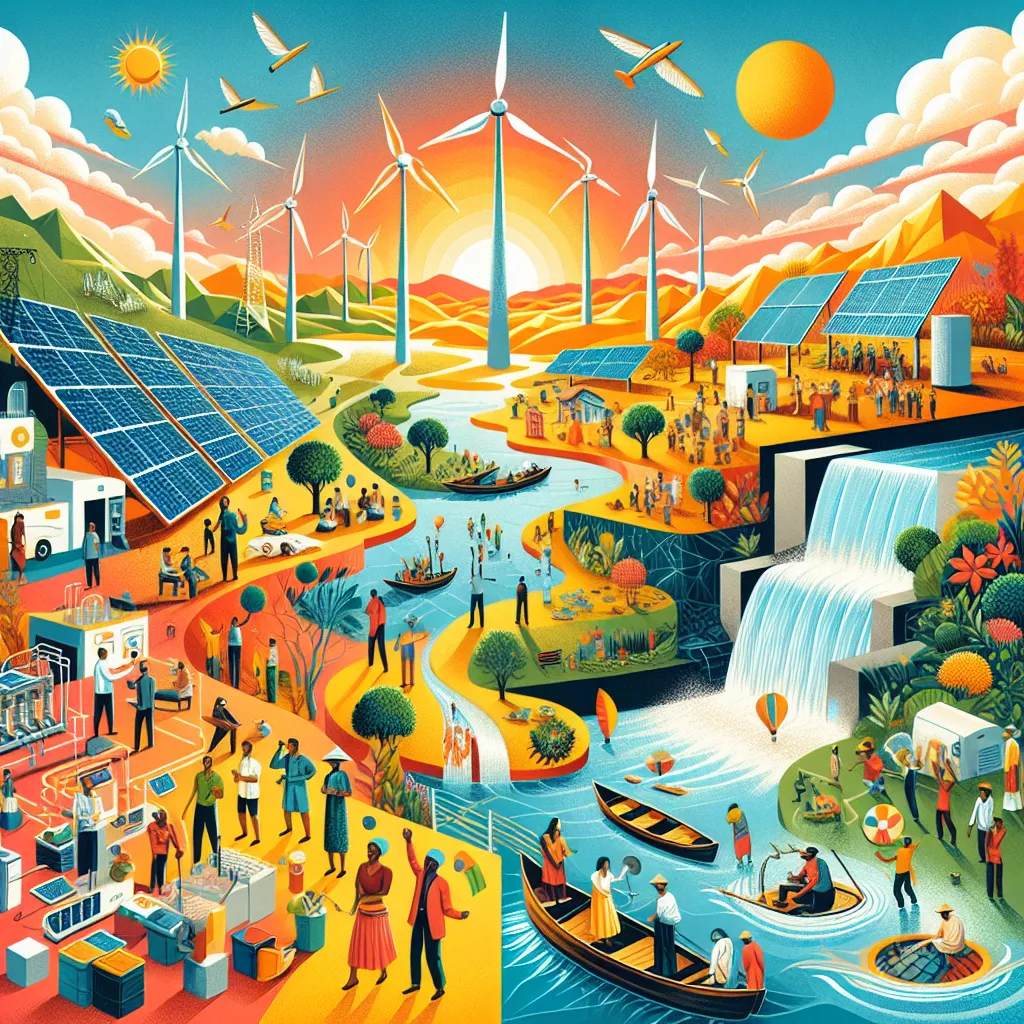As an IELTS Writing Task 2 expert, I’ve noticed that topics related to renewable energy and its impact on developing countries have become increasingly common in recent exams. This trend is likely to continue, given the global focus on sustainable development and climate change mitigation. Let’s explore this topic through a sample question and provide high-quality essays to help you prepare for your IELTS Writing Task 2.
Analyzing the Question
Let’s consider the following question, which is representative of the types of prompts you might encounter in your IELTS exam:
Many developing countries are investing in renewable energy sources. What are the advantages and disadvantages of this approach?
This question requires you to discuss both the positive and negative aspects of developing countries investing in renewable energy. It’s crucial to address both sides of the argument and provide a balanced response.
Sample Essay 1 (Band 8-9)
Here’s a high-scoring sample essay that effectively addresses the question:
In recent years, numerous developing nations have begun to prioritize investments in renewable energy sources such as solar, wind, and hydroelectric power. This approach offers significant advantages, although it is not without its challenges. This essay will explore both the benefits and drawbacks of this strategy.
The primary advantage of investing in renewable energy for developing countries is the potential for long-term energy independence. By harnessing their own natural resources, these nations can reduce their reliance on fossil fuel imports, which often strain their economies. Furthermore, renewable energy can provide a more stable and sustainable power supply, especially in rural areas where traditional grid infrastructure is lacking. This improved access to electricity can drive economic growth, enhance education opportunities, and improve healthcare services.
Another crucial benefit is the positive environmental impact. Renewable energy sources produce significantly fewer greenhouse gas emissions compared to fossil fuels, helping developing countries contribute to global efforts to combat climate change. This can also lead to improved air quality and public health outcomes, particularly in urban areas that often suffer from severe pollution.
However, the initial costs of implementing renewable energy technologies can be prohibitively high for many developing nations. The substantial upfront investments required for infrastructure and technology may divert resources from other pressing needs such as healthcare, education, or basic infrastructure development. Additionally, there may be a lack of skilled personnel to install, maintain, and operate these new energy systems, necessitating further investments in training and education.
Another potential drawback is the intermittent nature of some renewable energy sources. Solar and wind power, for instance, are dependent on weather conditions, which can lead to inconsistent energy supply. This volatility may require the development of expensive energy storage solutions or the maintenance of backup fossil fuel systems, potentially offsetting some of the environmental benefits.
In conclusion, while the investment in renewable energy by developing countries presents significant challenges, particularly in terms of initial costs and technical expertise, the long-term benefits of energy independence, economic growth, and environmental protection outweigh these drawbacks. To maximize the advantages, it is crucial for these nations to carefully plan their renewable energy strategies and seek international support and collaboration in implementing these technologies.
(Word count: 345)
Sample Essay 2 (Band 6-7)
Here’s a sample essay that would likely score in the Band 6-7 range:
Many developing countries are now putting money into renewable energy like solar and wind power. This approach has both good and bad points, which I will discuss in this essay.
One main advantage of using renewable energy in developing countries is that it can help them become more independent. They don’t need to buy as much oil or gas from other countries, which can save money. Also, renewable energy is better for the environment because it doesn’t produce as much pollution as burning fossil fuels. This can help improve air quality and fight against climate change.
Another good point is that renewable energy can bring electricity to remote areas. Many villages in developing countries don’t have access to the main power grid, but they can use solar panels or small wind turbines to generate their own electricity. This can improve people’s lives by allowing them to use lights, refrigerators, and other electrical devices.
However, there are also some disadvantages to this approach. The main problem is that renewable energy technology can be very expensive to set up. Developing countries often don’t have a lot of money, so spending it on renewable energy might mean they can’t spend as much on other important things like schools or hospitals.
Another issue is that renewable energy sources like solar and wind don’t always produce a steady supply of electricity. The sun doesn’t shine at night, and sometimes there isn’t enough wind. This means countries might still need to use some fossil fuels as a backup, which can be complicated and expensive.
In conclusion, while investing in renewable energy has many benefits for developing countries, such as increased independence and environmental protection, it also comes with challenges like high costs and unreliable power supply. I believe the advantages outweigh the disadvantages in the long run, but countries need to plan carefully to make the most of renewable energy.
(Word count: 309)
 Renewable energy in developing countries
Renewable energy in developing countries
Key Writing Tips
When addressing this topic in your IELTS Writing Task 2 essay, keep the following points in mind:
- Balanced argument: Ensure you discuss both advantages and disadvantages equally.
- Specific examples: Use concrete examples to illustrate your points, such as specific countries or renewable energy projects.
- Cohesive structure: Use clear paragraphing and appropriate linking words to organize your ideas logically.
- Varied vocabulary: Employ a range of vocabulary related to renewable energy and economic development.
- Grammar focus: Use a mix of simple and complex sentence structures to demonstrate your language proficiency.
Essential Vocabulary
Here are some key terms you should be familiar with when writing about this topic:
- Renewable energy (noun) /rɪˈnjuːəbəl ˈenədʒi/ – energy from a source that is not depleted when used
- Sustainable (adjective) /səˈsteɪnəbəl/ – able to be maintained at a certain rate or level
- Infrastructure (noun) /ˈɪnfrəstrʌktʃə/ – the basic physical and organizational structures and facilities
- Intermittent (adjective) /ˌɪntəˈmɪtənt/ – occurring at irregular intervals; not continuous or steady
- Fossil fuels (noun) /ˈfɒsəl fjuːəlz/ – fuels formed by natural processes such as anaerobic decomposition of buried dead organisms
- Energy independence (noun) /ˈenədʒi ˌɪndɪˈpendəns/ – the ability of a country to meet its own energy needs without relying on imports
- Greenhouse gas emissions (noun) /ˈɡriːnhaʊs ɡæs ɪˈmɪʃənz/ – the release of gases that contribute to the greenhouse effect
- Economic growth (noun) /ˌiːkəˈnɒmɪk ˈɡrəʊθ/ – an increase in the amount of goods and services produced per head of the population over a period of time
Conclusion
The topic of renewable energy in developing countries is likely to remain relevant in IELTS Writing Task 2. To prepare effectively, practice writing essays on related topics such as:
- The role of international cooperation in promoting renewable energy in developing countries
- The impact of renewable energy on job creation in developing economies
- Comparing the effectiveness of different types of renewable energy for developing nations
Remember to structure your essays clearly, use a range of vocabulary and grammar structures, and provide specific examples to support your arguments. By doing so, you’ll be well-prepared to tackle this topic in your IELTS Writing Task 2 exam.
We encourage you to practice writing an essay on this topic and share it in the comments section below. This active practice will help you improve your writing skills and prepare for success in your IELTS exam. Good luck with your preparation!


